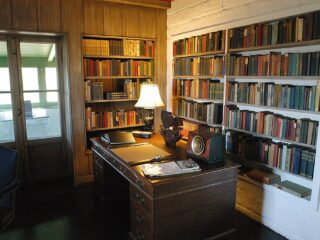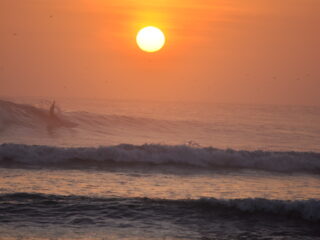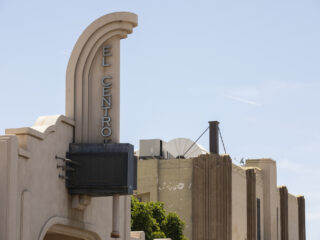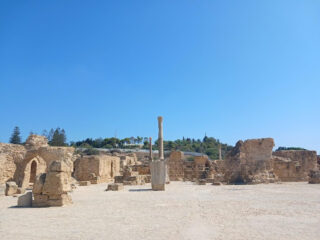by Deborah Lawrenson
By the time I reached Corfu, the season was in its last gasp. Evening hung early over the bay when I walked the stony beach at Kalami and found the White House. It was just as he described: defiant on a rock, the sea clawing at its feet. On the headland behind, cypress trees pointed into a curdling sky. Pebbles crunched under my feet as I went closer, and waves sighed on grey stones. A brackish smell of nets and seaweed was sharp in the air.
These lines are from a fictional travel memoir in my novel Songs of Blue and Gold, but this was a real journey I had wanted to make for a long time, and for the same reason as my narrator: I was looking for Lawrence Durrell.
It was October, the perfect time to arrive clasping a much-read copy of his Prospero’s Cell, a glimpse of Corfu as it once was, overlaid with all the poetic imagination of the writer-traveller as a young man.
With his expansive, all-encompassing opening line, Somewhere between Calabria and Corfu the blue really begins, Durrell takes us out of ourselves and along with him as he crosses into Greek waters from the heel of Italy and into a new life of light and heat. Reading it on a gloomy winter afternoon in the northern hemisphere is like injecting the grey sky with vivid blues and emeralds.
The book purports to be an evocative diary in which he is a serious young writer living blissfully in the sun, deeply in love both with his new wife and the freedom that Greece represents in the 1930s. The idea of escape – from political and economic uncertainty; there are plenty of parallels with our times – is a strong undertow.
It was an exile, too, from what he saw as a buttoned-up and repressed Britain. But since then, hordes of vacationing British and other northern Europeans have brought development and noise to parts of Corfu in a way that would have been unimaginable to the young Lawrence and Nancy, his gentle artist wife.
It was this awkward irony that worried me most. What I longed to see were Durrell’s unforgettable word-pictures. But were any of those scenes still there? Even when he wrote Prospero’s Cell, he did so with painful nostalgia. It was a lost place even then, his World of black cherries, sails, dust, fishes and letters from home.
What chance of finding it seventy years later?
But by October most of the tourists had gone and his much-loved old home in Kalami was available to rent. Under the balcony of the top-floor apartment he had built onto his fisherman-landlord’s dice-square house by the water’s edge. The wide blue bay glittered and was silent. Early evening was a lilac veil over the water between the island and the mountainous Albanian coast so close across the strait.
It really was just as he described so beguilingly: his landscape, his extraordinary spirit of place, in which the small and ordinary is hauntingly visual and infused with myth and history.
I realised that I was looking for what lay beneath, something more subtle than the cypress-clad hillsides and the strait being ploughed by Minoan Lines ferries. It was not so much a search for a ghost as an attempt to see what he saw, to put myself behind his eyes rather than to see him face on. I wanted to see what he saw, or rather to see how much of that remained.
That first evening, the magic really began.
Durrell’s desk, effectively a large pine dining table, still stands in the White House apartment. It is surprisingly low, and a nudge to recall that he was a very small man. And the many photographs on the wall are a reminder too that the Lawrence Durrell who lived here was an attractive, energetic figure, decades away from the reclusive old man of letters, writing his “incomprehensible masterpieces” as his equally famous brother, the zoologist Gerald dryly noted of The Alexandria Quartet and The Avignon Quintet.
To the side of the house, in what was once his garden, is a taverna. The whole property and several others besides are still owned by the Athinaios family, who were Durrell’s landlords in the 1930s. The sense of continuity heightened as a moon in the chilly night sky. Here, at the sea-house he loved, his words seemed to suggest that the past was barely more than a heartbeat away:
And invisibly the air (cool as the breath from the heart of a melon) pours over the window sills and mingles with the scent of the exhausted lamps. (…) It is so still that we have dinner under the cypress tree to the light of a candle. And after it, while we are drinking coffee and eating grapes on the edge of the mirror a wind comes: and the whole of heaven stirs and trembles. Then as the candle draws breath and steadies everything hardens slowly back into the image of a world in water, so that Theodore can point into the water at our feet and show us the Pleiades burning. (Prospero’s Cell)
In daylight next morning, the sea under the windows swirled a curious grey-malachite color. His words captured the effect: a milky ferocious green when the north wind curdles it and timeseemed to slip once again.
I couldn’t wait to stride out across the headland to find the flat yellow rock in the next bay where Henry Miller soaked up the sun, and the tiny shrine on the rocks further round where Durrell claimed he was re-born as the writer he strived to be. It was all still there, an enchanted world, it seemed, in the landscape, the carpets of pink cyclamen under the olives, the lapis lazuli effect of the sun on the deep blue Ionian.
But always there in the background, was a caveat. Durrell states that Prospero’s Cell is “a guide to the landscape and manners” of Corfu but it’s more like a lyrical personal notebook. And what he leaves out is as poignant and intriguing as what he includes. For example, at the end he writes of the White House:
We never speak of it, having escaped: the house in ruins, the little black cutter smashed. I think only that the shrine with the three black cypresses and the tiny rock-pool where we bathed must still be left. (Prospero’s Cell)
It is disingenuous, of course. All the biographical sources note, usually in a spirit of indulgence, that Durrell was not to be trusted with the absolute truth when it came to studding his prose with poetic jewels. Perhaps the house was damaged during World War II, but clearly it still stands, solid as it ever was. And if Lawrence and Nancy never spoke of their idyll it was because by the time he came to write the words, she had left him. He was sadder and wiser, and living in wartime Egypt with Eve Cohen who would become his second wife.
Further researchers and several biographies revealed a complex and contradictory character – and a further two wives. His work – most famously in The Alexandria Quartet– was concerned with duality: love and hate; truth and fiction; memory and misinterpretation. And running through it all, the transfiguring effect of time.
As I sat on the stones at Kalami with my own notebook containing ideas for a novel about love and memory, identity and biography, I thought about the way he seemed to pack so many different lives into one. The constant moves around the Mediterranean – from Rhodes to Cyprus, to the South of France, his final home. And while he was a comet blazing, what of the women he collided with along the way, I wondered? How did their stories end? And what of those he met, whose lives he changed but who did not rate even a footnote in the biographies?
The best biographies and autobiographies charm us into believing they allow us an insight into what a famous person was really like. But even the finest biographies are only one version of a life. What of the episodes that the biographer never discovers, or misinterprets according to his own prejudices? Soon, I was busy inventing a fictional version of Durrell – Julian Adie in Songs of Blue and Gold– and Elizabeth, a woman who loved but never succeeded in holding on to him.
Henry Miller, on the other hand, was a constant in Durrell’s life. The two men remained friends and correspondents from their first meeting in Paris in 1937 until Miller’s death in 1980. On a visit to Corfu, Miller found the flat rock at Yialiskari an ideal spot to think. (Those thoughts later incorporated into the book which arguably shows him at his finest, The Colossus of Maroussi.) Known as Cactus Beach by the locals on account of its bank of prickly pears, Yialiskari was deserted and atmospheric when I found it. It was sunny and warm enough to swim.
Below, the extraordinary blues and greens of the sea, the steep rise of the mountains in the north-east of Corfu, and the muscled brown-mauve hefts of the Albania hills, must have been unchanged from when Durrell and Miller saw them. But I could find no path down the steep slope to the rocks and no discernable small building.
In the end, I hired a boat and followed the coast until I found what I was looking for. It was there, after all, tucked into the mesomorphic rock folds as if holding fast to a wave frozen in stone.
Does travelling to the same places where a writer worked and lived allow us to understand them better, or is this illusory?
Both Durrell’s own words and all those written about him give the impression that he was a dazzling force of nature, with great energy, ambition and a true gift for friendship. Gerald Durrell gave one mischievous version of his older brother in his famous Corfu book My Family and Other Animals, in which “Larry” lives with the family (which he never did) and is the ‘diminutive blond firework’ by turns pompously literary and hilarious.
Lawrence Durrell was flawed, of course. Perhaps he was too idealistic, perhaps too selfish at times, certainly self-destructive; a man who recklessly embraced life, but was serious under the sybaritic exterior.
Most of all he was a writer, a visionary, a creator. He opened my eyes to a different place and a different perspective.
To purchase Songs of Blue and Gold, please click on this link:








